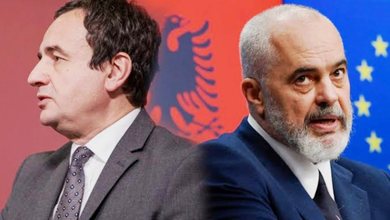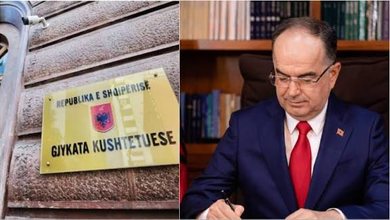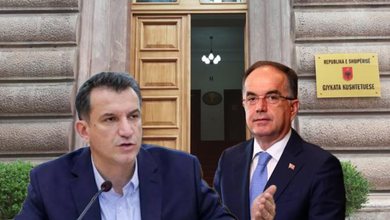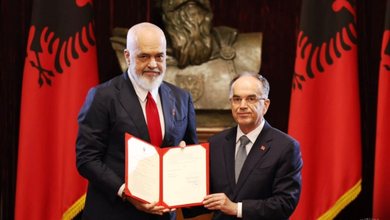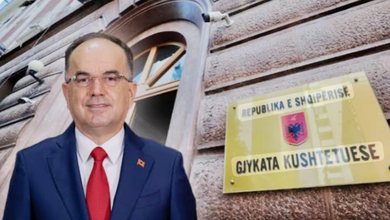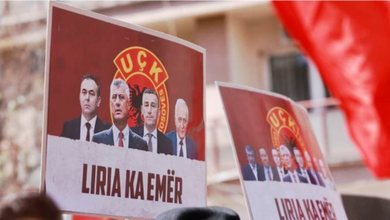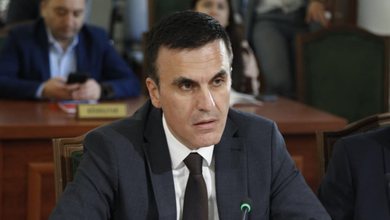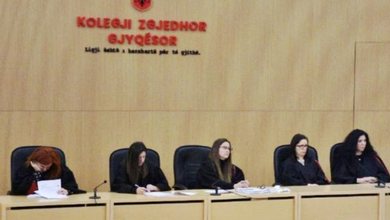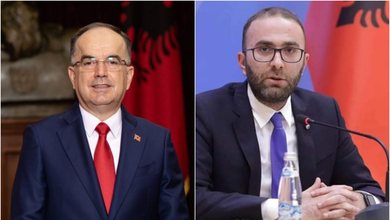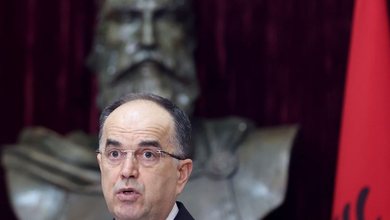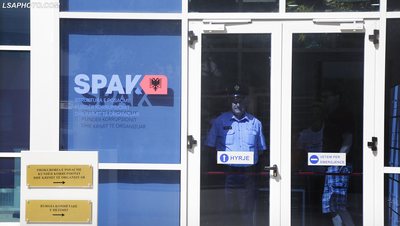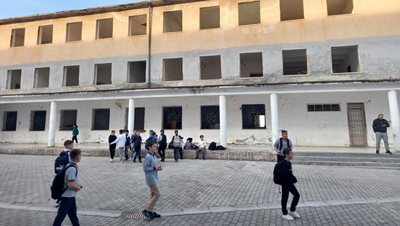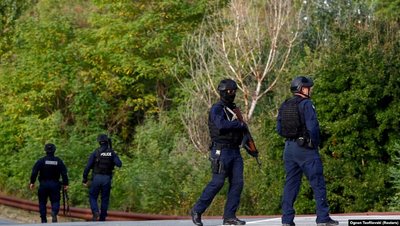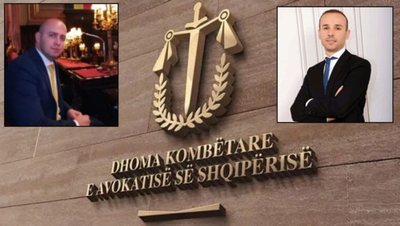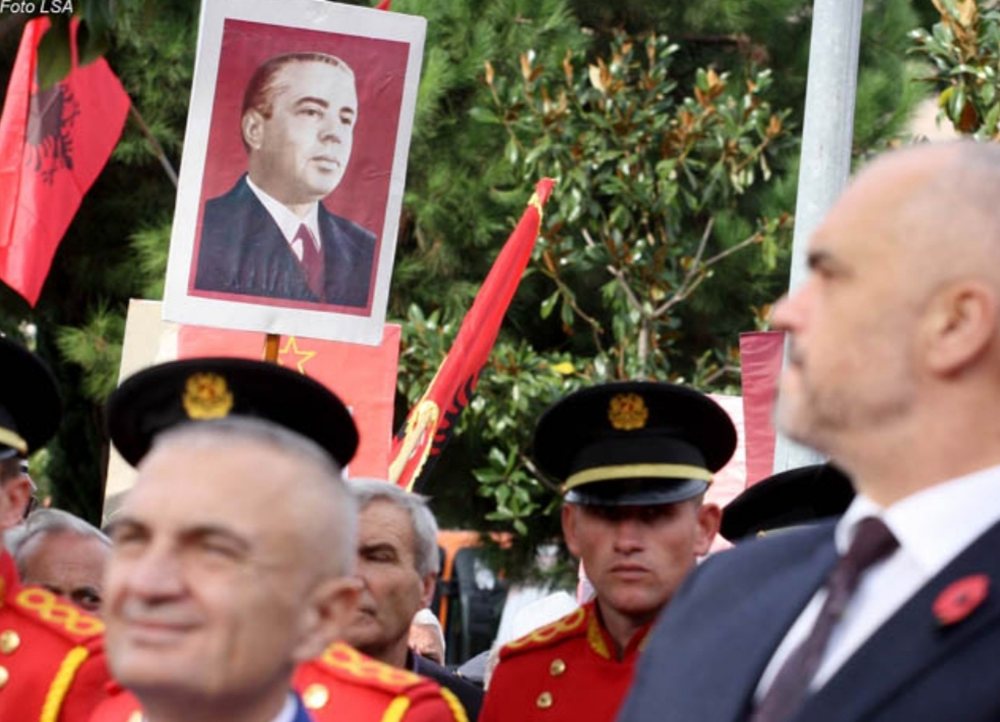
On Monday, October 6, 2025, news circulated in newspapers and social networks that the Parliamentary Institute, an organ of the Albanian Parliament, had distributed among the deputies of the Parliament the list of prominent personalities of the month of October. Among them was also remembered Enver Hoxha, the former dictator of Albania from the end of World War II until his death (April 11, 1985). As any Albanian in Albania who was a student before 1992 clearly remembers, the dictator was born on October 16, 1908. Once upon a time, the month of October and his birthday were synonymous with each other, and his figure was part of commemorative-panegyric ceremonies throughout the country. When his statue was erected in "Skënderbej" Square and when the "Enver Hoxha" Museum (later "Pyramid", today the home of the TUMO center) was opened, pilgrimage to that museum and veneration of the monument were a common ritual during those few years of socialist Albania after his death.
After this, civil society and a few members of the Assembly reacted by expressing their position against this reminder. The Assembly, on the other hand, after questions from journalists, ignored the clarification of the circulated text, considering it simply a “slip” of the Institute. We all make mistakes, but while the mistake of a bureaucrat, of the lowest link in the state administration, is easily correctable, how easily can we accept the mistake of an “institute”? Every etymological dictionary tells us that the name “institute” comes from the Latin verb “instituĕre”, and means “with foundation”, “with instruction”, “with order” (from which and “institution”, that is, an environment with a foundation, a community with a stable basis).
While the expectations that the Albanian Parliament, this institution-foundation of democracy, will act as such are justified, we see that its foundation and foundation remain in the hands of the “specialist” (according to the Parliament), whose error we should not notice. However, the possibility cannot be ruled out that the Parliament’s excuse is completely true and the specialist’s error is completely normal for the human race (this tangential proposal, to replace the administrative staff of the Parliament with virtual employees). However, is the inclusion of the dictator’s name in the calendar of personalities of the Albanian Parliament justified with the banal explanation that it was a slip of the tongue?
In 2006 and 2016, the Albanian Parliament adopted two resolutions condemning the crimes of communism and discouraging the panegyric commemoration of the perpetrators of those crimes, namely, the top leadership of the one-party state. These resolutions are inspired by previous international resolutions, by the Parliamentary Assembly of the Council of Europe (2006) and by the “Prague Declaration” (2008). The EC resolution calls on the countries of the former Eastern Bloc to dismantle the communist legacy by investigating the crimes and prosecuting those responsible. The “Prague Declaration” calls for the crimes of communism to be considered and assessed in the same way as the crimes of World War II and the Holocaust. To achieve this, most countries that had experienced communism also adopted the “Lustration Law”. Meanwhile, in Albania, such a law never came into force, as, while the Parliament approved it in 2009, the law was overturned by the Constitutional Court.
Let us return to the historical figure who brought the debate, Enver Hoxha. While during the period of socialist Albania his memory was immortalized in the names of institutions and through a multitude of busts in every institution and in many squares of Albanian cities, this memory was contested and removed from circulation with the removal or demolition of his busts, wherever they were placed. The opposition reached its peak when on February 20, 1991 his monument in “Skënderbej” Square was demolished. Chronologically, the next most important date in the continuation of the dismantling of his memory is February 13, 1995, when the President of the Republic of Albania, Sali Berisha, with Decree no. 1018, stripped Hoxha and 7 other people of all their decorations and honorary titles (Nexhmije Hoxha, Shefqet Peçi, Hysni Kapo, Gogo Nushi, Spiro Koleka, Haki Toska, Haxhi Lleshi, figures 1 and 2). The decree even mentions the motive: for the criminal act of genocide committed against the Albanian people. Technically, resolutions or declarations, domestic or international, which Albania has also accepted, are simply moral promises, not legal obligations for implementation. Therefore, the above decree of the President constitutes a legal act that contributes significantly to the eradication of the memory of the former dictator. However, this decree has a very small “problem”: it has never been published in any Official Gazette!
According to the laws in force in the Republic of Albania, at the time of the above Decree and today, every law, decree, decision, etc., must be published in the Official Gazette, in order to obtain legal value. To find the reference of the Official Gazette, for the purpose of this article, we reviewed the contents of the printed Official Gazettes (1995-1999) and those that are on-line on the website of the Center for Official Publications (2000 and later). Surprisingly, the above decree of the President is not found in any issue of the Official Gazette since 1995, until today, October 2025. Which means that, referring to the laws and regulations of the country, when the law, decree, decision, etc., is not published in the Official Gazette, it HAS NO LEGAL VALUE. So, it is the same as if it did not exist.
Fortunately, this decree became known in 2017 under the usual bombastic headline of Albanian newspapers: “Berisha’s decree is published”. As the newspaper reports, the decree was published on Facebook by the (then) director of the Institute for Studies on the Crimes and Consequences of Communism, Mr. Agron Tufa. A few years later, in 2023, former President Berisha serves up the same images of the decree through social networks with the same purpose: to prove that he is the one who discredited Enver Hoxha. However, since it has no legal value, is this discrediting, or is it not discrediting? Beyond the statements in image and voice, when the moment comes to verify the real positions of the institutions, in the recent past and present, we see, unfortunately, that no one takes their stance towards the former dictator of Albania, Enver Hoxha, seriously.
Despite the resolutions we mentioned, as the current case of the Parliamentary Institute shows, the memory of communism and the memory of the former dictator continues to remain alive in Albania not as an example to avoid repeating, but as a demonstration of myopia and unwillingness to look beyond the deceitful reality. The Assembly has adopted resolutions, but has also legally supported institutions that have the duty to deal with the investigation and clarification of the crimes of communism. What will happen next with the crimes that are clarified, no one knows. Likewise, the former President has signed a decree of disgorgement and (moral) punishment, but has not turned it into a legal act of the Republic. At the same time, we have seen how the former dictator's museum was restored and transformed into a chaotic mass of concrete and bushes, violently overlapping the architectural aesthetics of the original building, but nothing in it explains the reason for the TUMO dump. A little further on, the villa in which the dictator lived in the last years of his life, until his death, was turned into a center of art and culture. For this baptism, a simple ceremony similar to modern art auctions was sufficient. While Villa 31 was inaugurated as an art center, a fragment of a building in the former prison camp of Spaç was alienated without reason, without study, without decision, simply based on a verbal agreement. In neither of the above buildings, the Pyramid and Villa 31, is there a clear position about their previous function, and this current one, neither in text nor in artistic language. In both cases, serious and credible reflection is missing. Which means that the change of their function does not aim to change anything through the act of change in itself, this act is the same as what the tenant performs when entering the next house: he paints it, cleans it, makes it ready for occupancy, and enters it. But that apartment is not his property, that apartment has a physical owner, as well as a moral owner, who may be the same or different. In both cases, the permanent owner of the two buildings we mention has been and is the state. And while the state does not clearly distance itself from the previous moral owner, the historical person and the man Enver Hoxha, it has naturally merged with him. The names change, the mentality and morality remain the same.
As we write these lines, none of the places of memory of the crimes of communism has ever been shown similar seriousness, attention and investment. As we write these lines, there are still family members who have not found the bodies of those killed by the dictatorial regime. However, the perpetrator of the crimes identified and lived (some of the crimes buried with the victims) continues to be remembered with honor by our Parliament./Reporter.al


